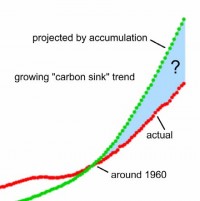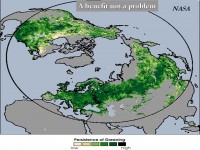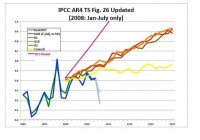By Marty Hoerling, Physical Sciences Division, ESRL
PSD researcher Marty Hoerling gave an invited presentation entitled, “Climate Change in the Grain Belt,” on September 10 at the 2008 Corn and Climate Conference in Ames, IA. His presentation focused on the fact that since 1895 there has not been a warming of temperatures in the Corn Belt during the growing season. It is important for researchers to sort out the reason why, since historical data does not show the warming that would be anticipated from green house gas increases. Increased precipitation has kept this region cool, which is favorable to corn yields. It is unknown why it has been wetter during this period, but is most likely attributable to natural variations in climate.

There appears to be a tendency for corn yield to be compromised when temperatures are elevated. It is possible that temperature values in the growing season could increase in the Corn Belt as much as 6-7°F or more by the end of the century. If this comes to pass, there are indications that corn yield would suffer - but by how much is uncertain. Since there has not yet been any warming in this region, it is unclear what, if any, action should be taken. There could be proponents that might discount any action being taken now for warming that could come later. ESRL’s Director, Sandy MacDonald, also gave a presentation at this Workshop entitled, “Probability of Extreme Climates.” NOAA co-sponsored this special extension of the Growing the Bioeconomy Conference to assess recent climate trends in the Midwest, as well as seasonal and long-term climate assessments. Read more here.
By Ted Nordhaus and Michael Shellenberger, LA Times
As the election enters its endgame, Democrats and their environmental allies face a political challenge they could hardly have imagined just a few months ago. America’s growing dependence on fossil fuels, once viewed as a Democratic trump card held alongside the Iraq war and the deflating economy, has become a lodestone instead. Republicans stole the energy issue from Democrats by proposing expanded drilling—particularly lifting bans on offshore oil drilling—to bring down gasoline prices. Whereas Barack Obama told Americans to properly inflate their tires, Republicans at their convention gleefully chanted “Drill, baby, drill!” Obama’s point on conservation and efficiency was lost on an electorate eager for a solution to what they perceive as a supply crisis.
Democrats and greens ended up in this predicament because they believed their own press clippings—or, perhaps more accurately, Al Gore’s. After the release of the documentary film and book “An Inconvenient Truth,” greens convinced themselves that U.S. public opinion on climate change had shifted dramatically, despite having no empirical evidence that was the case. In fact, public concern about global warming was about the same before the movie—65% told a Gallup poll in 2007 that global warming was a somewhat or very important concern in comparison to 63% in 1989. Global warming remains a low-priority issue, hovering near the bottom of the Pew Center for People and the Press’ top 20 priorities. By contrast, public concern about gasoline and energy prices has shifted dramatically. While liberals and environmentalists were congratulating themselves on the triumph of climate science over fossil-fuel-funded ignorance, planning inauguration parties and writing legislation for the next Democratic president and Congress, gas prices became the second-highest concern after the economy, according to Gallup.
This summer, elite opinion ran headlong into American popular opinion. The train wreck happened in the Senate and went by the name of the Climate Security Act. That bill to cap U.S. greenhouse gas emissions would have, by all accounts (even the authors), increased gasoline and energy prices. Despite clear evidence that energy-price anxiety was rising, Democrats brought the bill to the Senate floor in June when gas prices were well over $4 a gallon in most of the country. Republicans were all too happy to join that fight.
Indeed, they so relished the opportunity to accuse Democrats of raising gasoline prices in the midst of an energy crisis, they insisted that the 500-page bill be read into the Senate record in its entirety in order to prolong the debate. Within days, Senate Democrats started jumping ship. Democratic leaders finally killed the debate to avert an embarrassing defeat, but by then they had handed Republicans a powerful political club.
In a tacit acknowledgment of their defeat, some green leaders, such as the Sierra Club’s Carl Pope, have endorsed the Democrats’ pro-drilling strategy. But few of them seem to realize the political implications. The most influential environmental groups in Washington—the Natural Resources Defense Council and the Environmental Defense Fund—are continuing to bet the farm on a strategy that relies on emissions limits and other regulations aimed at making fossil fuels more expensive in order to encourage conservation, efficiency and renewable energy. But with an economic recession likely, and energy prices sure to remain high for years to come thanks to expanding demand in China and other developing countries, any strategy predicated centrally on making fossil fuels more expensive is doomed to failure. Read more here.
By Tamara Cohen
’Potty peer’: Lord Monckton said his sceptical views were misrepresented. The BBC is being investigated by television watchdogs after a leading climate change sceptic claimed his views were deliberately misrepresented.
Lord Monckton, a former adviser to Margaret Thatcher, says he was made to look like a ‘potty peer’ on a TV programme that ‘was a one-sided polemic for the new religion of global warming’. Earth: The Climate Wars, which was broadcast on BBC 2, was billed as a definitive guide to the history of global warming, including arguments for and against.
During the series, Dr Iain Stewart, a geologist, interviewed leading climate change sceptics, including Lord Monckton. But the peer complained to Ofcom that the broadcast had been unfairly edited. “I very much hope Ofcom will do something about this,” he said yesterday. “The BBC very gravely misrepresented me and several others, as well as the science behind our argument. It is a breach of its code of conduct. I was interviewed for 90 minutes and all my views were backed up by sound scientific data, but this was all omitted. They made it sound as if these were just my personal views, as if I was some potty peer. It was caddish of them.”
Ofcom confirmed it was looking into a “fairness complaint” about the documentary. A BBC spokesman said: “We stand by the programme.” Lord Monckton, 56, a former journalist and Cambridge graduate, says scientific data shows the world is cooler today than in the Middle Ages.
He appeared alongside other sceptics including distinguished Florida-based meteorologist Professor Fred Singer, John Christy, a climate change expert and adviser to the U.S. government and the climatologist Dr Patrick Michaels, of the University of Virginia. All their interviews, he claims, were heavily cut so that they appeared as personal views.
“We do not dispute that there is more carbon dioxide in the atmosphere, but we do dispute its effects”, he said. “The data shows that 2008 is the same temperature as 1980 and that the effects of these changes in the atmosphere are not negative but more likely to be beneficial.”
Lord Monckton played a key role in a legal challenge heard in the High Court in October 2007 in an effort to prevent Al Gore’s film on global warming, An Inconvenient Truth, from being shown in English schools. See story here.
By Seth Borenstein, AP
International scientists say worldwide man-made emissions of carbon dioxide - the main gas that causes global warming - jumped 3 percent from 2006 to 2007. Large increases in China, India and other developing countries spurred the growth of carbon dioxide pollution to a record high of 9.34 billion tons of carbon. Figures released by science agencies in the United States, Great Britain and Australia show that China’s added emissions account for more than half of the worldwide increase. China passed the United States as the No. 1 carbon dioxide polluter in 2006. Emissions in the United States increased nearly 2 percent in 2007, after declining the previous year.
Icecap Note: Emissions have been accelerating in recent years but atmospheric rates of increases year to year have not. The increase in the last 5 years have averaged just 0.42% per year, that is actually a little less than the yearly increases over the period of record since the late 1950s.

See larger image here.
This argues for a strong sink and a much shorter lifetime. See this by Tom Segalstad and “CO2, The Houdini of Gases” by Alan Siddons. As Alan has pointed out that carbon sinks must logically be increasing as time passes since human emissions are increasing. That is, the more we pump out, the more the earth supposedly absorbs.

See larger image here.
CO2 is also not pollution but a plant fertilizer. The CO2 increase has benefited vegetation, improved crops that have helped feed the increasing populations.

See larger image here.
By Peter B. Lord, Providence Journal Environmental Editor
Michael E. Mann, a Nobel Prize-winning scientist, had just spent an hour explaining why he thinks there is virtual scientific consensus that people are causing the earth to warm and sea levels to rise, when a self-described “left-leaning, pro-environment person,” a meteorologist, rose to angrily dispute him.
The critic said thousands of scientists disagree with Mann’s contention that carbon dioxide is causing climate change. Others have discredited Mann’s figures on unprecedented temperature hikes. And some wish he would leave his university, Penn State. The critic didn’t give his name. But later Herb Stevens, a North Kingstown meteorologist who makes his living as the “Skiing Weatherman” on many local television stations, confirmed he was the critic. “I’m not some crackpot,” he said. “I’ve spent a lot of time in the last 10 years researching this matter. It is the greatest hoax perpetrated on mankind.”
Mann, who has been vilified by Sen. James Inhofe, R-Okla., and a host of other climate skeptics, responded calmly before an audience of nearly 1,000 on Tuesday. Natural forces don’t account for the warming that is being observed, he said. Only carbon dioxide fits. Then he added:
“A fossil-fuel funded amateur has a Web site that vilifies scientists in my field,” he said. Questions about his data were rejected, he said, by the National Academy of Science and by the United Nations’ International Panel on Climate Change. “I don’t think by any stretch of the imagination has our science been discredited, except perhaps by some far-out fringe of the blogosphere.” Mann got a big round of applause.
He later said he is used to the attacks. Climate change skeptics see that they are losing the scientific arguments, he said, so they are stepping up ad hominem attacks on scientists. One questioner said it was well known in the scientific community that disappearing snows of Kilimanjaro have nothing to do with climate change. But Mann said the questioner was wrong. The snows are melting and evaporating, both because of climate change, he said.
Stevens, contacted yesterday, said one student followed him outside of the hall, asking for more information. He said the idea that the debate is over is “beyond arrogant.” Read more here. Write the author here.
See the real story about the Hockey Stick and stories and about Kilimanjaro. H/T Marc Morano.
Economist’s View
The American anti-intellectual threat, by Jeffrey D. Sachs, Commentary, Project Syndicate: In recent years, the United States has been more a source of global instability than a source of global problem-solving.
Examples include the war in Iraq, launched by the US on false premises, obstructionism on efforts to curb climate change, meager development assistance and the violation of international treaties such as the Geneva Conventions. While many factors contributed to America’s destabilizing actions, a powerful one is anti-intellectualism…
By anti-intellectualism, I mean especially an aggressively anti-scientific perspective, backed by disdain for those who adhere to science and evidence. The challenges faced by a major power like the US require rigorous analysis of information according to the best scientific principles.
Climate change, for example, poses dire threats… that must be assessed according to prevailing scientific norms… We need scientifically literate politicians adept at evidence-based critical thinking to translate these findings and recommendations into policy and international agreements.
In the US, however, the attitudes of President Bush, [and] leading Republicans ... have been the opposite of scientific. The White House did all it could for eight years to hide the overwhelming scientific consensus that humans are contributing to climate change. It tried to prevent government scientists from speaking honestly to the public. The Wall Street Journal has similarly peddled anti-science and pseudo-science to oppose policies to fight human-induced climate change.
These anti-scientific approaches affected not only climate policy, but also foreign policy. The US went to war in Iraq on the basis of Bush’s gut instincts and religious convictions, not rigorous evidence. ...
These are ... powerful individuals out of touch with reality. They reflect the fact that a significant portion of American society, which currently votes mainly Republican, rejects or is simply unaware of basic scientific evidence regarding climate change, biological evolution, human health and other fields. ...
Recent survey data by the Pew Foundation found that while 58 percent of Democrats believe that human beings are causing global warming, only 28 percent of Republicans do. Similarly, a 2005 survey found that 59 percent of self-professed conservative Republicans rejected any theory of evolution, while 67 percent of liberal Democrats accepted some version of evolutionary theory.
To be sure, some of these deniers are simply scientifically ignorant, having been failed by the poor quality of science education in America. But others are biblical fundamentalists… They reject geological evidence of climate change because they reject the science of geology itself.
The issue here is not religion versus science. All of the great religions have traditions of fruitful interchange with—and, indeed, support for—scientific inquiry. ... The problem is an aggressive fundamentalism that denies modern science, and an aggressive anti-intellectualism that views experts and scientists as the enemy. It is those views that could end up getting us all killed. ... Read more here.
By Scott Rothschild, LJWorld news
Global warming? So what. That was the message Monday from research scientist and best-selling author Roy Spencer to legislative leaders, lobbyists and leading business officials at the Kansas Chamber of Commerce business and energy summit.
Spencer is a principal research scientist at the University of Alabama in Huntsville and author of “Climate Confusion.” Spencer doesn’t deny that Earth is warming, but he attributes that to natural climate cycles and not to the increase in greenhouse gases from burning fossil fuels. “There are many of us skeptical of mankind being the cause of global warming,” he said.
And, he said, increased carbon dioxide is not a bad thing, and can either be absorbed by the environment or have positive effects, such as increased agricultural production.
Most scientists disagree with Spencer’s findings. They believe increases in carbon dioxide from human burning of fossil fuels, such as coal and oil, are causing climate changes that, if left unchecked, will result in catastrophic flooding, storms, famine and changes in the environment.
But Spencer said nature is always changing in ways that produce winners and losers. Even if mankind is affecting the environment, he asked, “Why is it wrong for the climate to be different because we are here?”
During a question-and-answer session, Stormont-Vail HealthCare president and chief executive officer Maynard Oliverius noted that carbon dioxide emissions have skyrocketed in recent years. “So what?” Spencer said. “What’s your point?”
Spencer also advised the several hundred people in attendance not to trust the mainstream media on the topic of carbon dioxide emissions and climate change. “You will be misled on what is out there in the scientific literature,” he said.
Nancy Jackson, executive director of the Climate and Energy Project at the Land Institute in Salina, attended the forum and said Spencer’s talk supported the position of the Kansas Chamber of Commerce, which has urged the construction of two coal-fired power plants in southwest Kansas. The proposed project has been rejected by Gov. Kathleen Sebelius because of concerns about carbon dioxide emissions.
“I would clearly prefer that a forum on energy and business in the state of Kansas include diverse viewpoints,” Jackson said. “I’m hopeful we will see that in the future.” Read more here.
Read here how the following day James Hansen warned that “If we don’t get this thing under control we are going to destroy the creation” at the Kansas Wind and Renewable Energy Conference.
By Kathryn Marchocki, Union Leader
A task force charged by Gov. John H. Lynch with crafting a climate change action plan says its goal is to find ways to reduce greenhouse gas emissions that are good for the state’s economy. That conclusion already is drawing fire from critics.
The task force, which includes lawmakers, scientists, business leaders and economists, is analyzing the economic impact that proposals to reduce greenhouse gas emissions would have in various sectors of the state, such as transportation, land use, government, commerce and industry and agriculture.
The deadline to present their findings to the governor and top lawmakers has been extended from this month to December. “What we see as our goal is how we can improve the economic development in the state while, at the same time, reducing greenhouse gas emissions. That’s what our challenge is. There are many examples out there that we can do, if we do it in the right way,” said Cameron P. Wake, a climatologist and research professor at the University of New Hampshire’s Institute for the Study of Earth, Oceans and Space.
A key consideration is finding ways to reduce the state’s reliance on imported foreign oil by developing alternative and renewable energy sources at the local and regional levels, task force members said. This not only would reduce greenhouse gas emissions, but allow money reinvested in such ventures to remain in the local economy, they said. It also would relieve businesses and citizens of the stress and uncertainty created by extreme price shifts in oil and gasoline prices, members added.
Currently, imported fossil fuels cost the state more than $1 billion a year, all of which goes out of state since New Hampshire has neither oil reserves nor refineries, said Robert R. Scott, director of the air resources division at the state Department of Environmental Services. The state agency is taking the lead in developing a climate change action plan that will recommend goals to reduce greenhouse gas emissions and steps to meet them. “If we can spend that money on energy created in New England, we recycle that money in our economy,” Wake said. Task force members split up into working groups, each of which focuses on specific sectors, such as land use, transportation, agriculture, education, commerce, industry and education.
Each group’s proposal to reduce greenhouse gas emissions in their sector is being analyzed by UNH climatologists and economists to determine how much of a reduction they would create compared to the impact they would have on the economy, Scott said.
Critics of the task force’s work include retired meteorologist and climate change skeptic Joseph S. D’Aleo of Hudson. D’Aleo is meteorological adviser to the Science and Public Policy Institute, a non-profit research and education group based in Haymarket, Va. that describes itself as “dedicated to sound public policy based on sound science.” The group concedes New Hampshire’s average annual temperature has warmed by about 2 degrees Fahrenheit during the last 113 years, according to the institute’s 32-page analysis of the New Hampshire task force’s work.
But it maintains the warming is due to “natural climate change” and claims the state’s residents and industries have adapted well to it. In addition, D’Aleo argued it would be futile to cap New Hampshire’s greenhouse gas emissions because, in just one week’s time, any gains would be “subsumed by global greenhouse gas emissions increases,” mainly from China and India. Read more here.
I attended the hearing with several scientists who made comments. Read Ric Werme, one of the attendees submitted comments here. The NH Task Force is using the climate model of the Union of Concerned Scientists which projects winter warming of 13F this century for New Hampshire and the northeast. This is way out of line with any other model. Given that we are 9 years into the first decade and have seen 2F cooling for NH cities and towns argues the next 9 decades must warm 16.5F! See how the IPCC models and the UCS model compares to actual data (rose) below (larger here). The task force is proceeding with the model as their reality.



